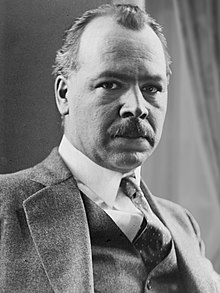Nikolai Vavilov
| Nikolai Vavilov | |
|---|---|

Nikolai Vavilov in 1933
|
|
| Born | Nikolaj Ivanovic Vavilov 25 November 1887 Moscow, Russian Empire |
| Died | 26 January 1943 (aged 55) Saratov, RSFSR, Soviet Union |
| Citizenship | USSR |
| Nationality | Russian |
| Fields |
Botany Genetics |
| Institutions | Saratov Agricultural Institute Lenin All-Union Academy of Agricultural Sciences |
| Alma mater | Moscow Agricultural Institute |
| Known for | Centres of origin |
| Notable awards |
Lenin Prize Fellow of the Royal Society |
| Author abbrev. (botany) | Vavilov |
Nikolai Ivanovich Vavilov ForMemRS (Russian: Никола́й Ива́нович Вави́лов; IPA: [nʲɪkɐˈlaj ɪˈvanəvʲɪtɕ vɐˈvʲiləf]) (November 25 [O.S. November 13] 1887 – January 26, 1943) was a prominent Russian and Soviet botanist and geneticist best known for having identified the centres of origin of cultivated plants. He devoted his life to the study and improvement of wheat, corn, and other cereal crops that sustain the global population.
Vavilov was born into a merchant family in Moscow, the older brother of renowned physicist Sergey Ivanovich Vavilov. "The son of a Moscow merchant who'd grown up in a poor rural village plagued by recurring crop failures and food rationing, Vavilov was obsessed from an early age with ending famine in both his native Russia and the world." He graduated from the Moscow Agricultural Institute in 1910 with a dissertation on snails as pests. From 1911 to 1912, he worked at the Bureau for Applied Botany and at the Bureau of Mycology and Phytopathology. From 1913 to 1914 he travelled in Europe and studied plant immunity, in collaboration with the British biologist William Bateson, who helped establish the science of genetics.
...
Wikipedia
